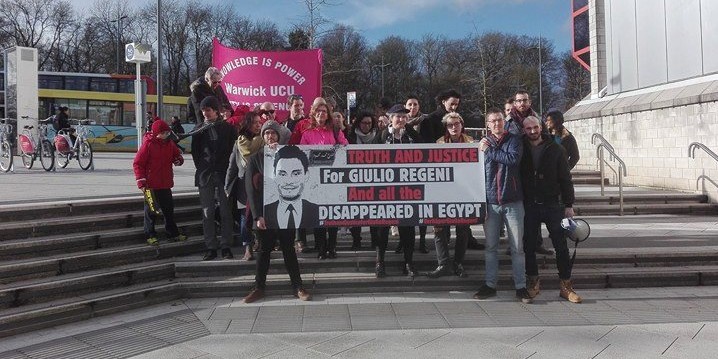Warwick students campaign for student killed in Egypt
Students from all over campus gathered last Thursday 25 January to demand from the Egyptian state “truth and justice” for Giulio Regeni.
A group of students took initiative in front of the Arts Centre on the seventh anniversary of the Egyptian Revolution and second anniversary of the disappearance of PhD student Giulio Regeni, whose tortured body was found on 3 February 2016 on the outskirts of Cairo.
The initiative was endorsed by the University and Colleges Union (UCU), Amnesty Warwick, and Warwick Anti-Casualisation (WAC); there were representatives of all three organisations present, as well as non-affiliated individuals.
The gathering was described by the WAC as an act to “add our voices to all those who demand from the Egyptian state truth and justice for Giulio Regeni and for all those who disappeared in the country”.
Giulio Regeni was an Italian graduate of Cambridge University who was abducted and tortured to death in Egypt two years ago. He was researching Egypt’s independent trade unions at the time of his disappearance, a controversial topic.
In 2016 The Economist suggested that as Regeni’s research and activities contained left-wing political leanings, the Egyptian police are strongly suspected of involvement in his murder throughout Europe.
At the time an Egyptian official had suggested that Mr Regeni may have died in a road accident, according to the BBC.
Last year, The Guardian also wrote that Regular meetings in Rome between Egyptian and Italian investigators suggest progress is being made to discover the truth about Regeni’s death.
On the WAC Facebook page, the society gave reasons as to why they felt the case was one of great social injustice.
Giulio’s case is not an isolated one. According to Amnesty International’s report on Egypt for 2016-2017, the National Security Agency (NSA) subjected hundreds of detainees to enforced disappearance
Lorenzo “Fe” Feltrin, a current PhD student studying at the University of Warwick, helped to organise the gathering and spoke at the event on Thursday. He told The Boar: “We displayed a banner saying “Truth and justice for Giulio Regeni and all those who disappeared in Egypt.”
“The picture of the end of the gathering was then sent to the Italian national campaign Verità per Giulio Regeni, which diffused it through its social media channels”.
“On the same day, similar initiatives occurred in 109 Italian cities and, in the UK, at the University of Cambridge, the University of Oxford, and the University of Bristol (there might be more, but these are the ones I know of).”
Lorenzo explained one motive of the gathering was to try to press the British and Italian government on these matters, provoking them to protect these rights worldwide.
According to Lorenzo, however, both governments “have so far proved to be more responsive to a misconceived notion of economic and security interests, and they maintain good relations with the exceptionally dictatorial Egyptian regime; although the Italian government had recalled its ambassador in Egypt, it has later backtracked on this”.
Lorenzo further highlighted the regularity of such cases human rights violation, cases of torture and forced disappearance since General Sisi’s coup that have been publicly denounced by groups such as Amnesty International and Human Rights Watch.
The disappearance, torture and murder of Giulio Regeni epitomise two more general questions: the state of civil and political rights in Egypt and that of academic freedom worldwide
“Concerning academic freedom, it is important to remember that Giulio Regeni, while being Italian, was killed during his PhD research for a British academic institution.”
“Therefore, the failure of the British government to take decisive action to pressure the Egyptian regime does not help carrying out research in authoritarian contexts”, said Lorenzo.
Whilst Lorenzo commended the work of some British institutions to place pressure on the government, he expressed that “initiatives for truth and justice by the universities as institutions could have been stronger”.
“The cruelty and arbitrariness of Regeni’s torture and assassination have shocked many and will not be easily forgotten.”
“All mobilisations around this issue by students in the UK and elsewhere are a contribution to human rights and academic freedom, so I think and hope they will continue in the future”.

Comments